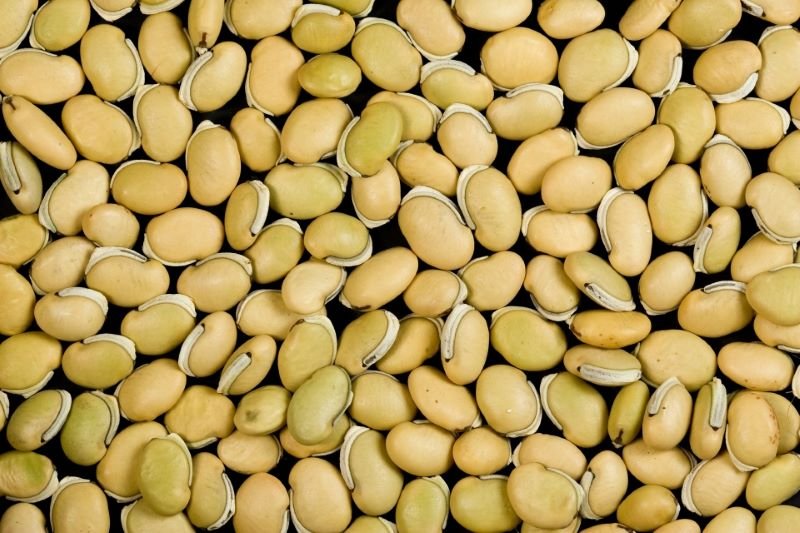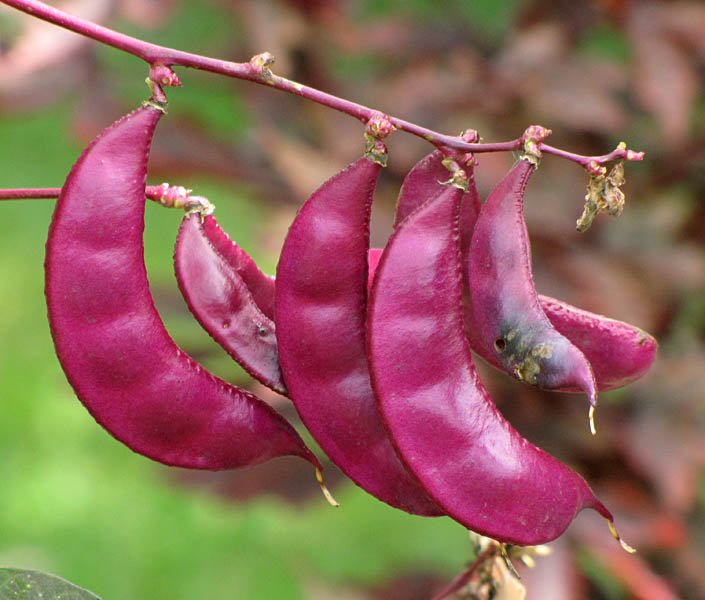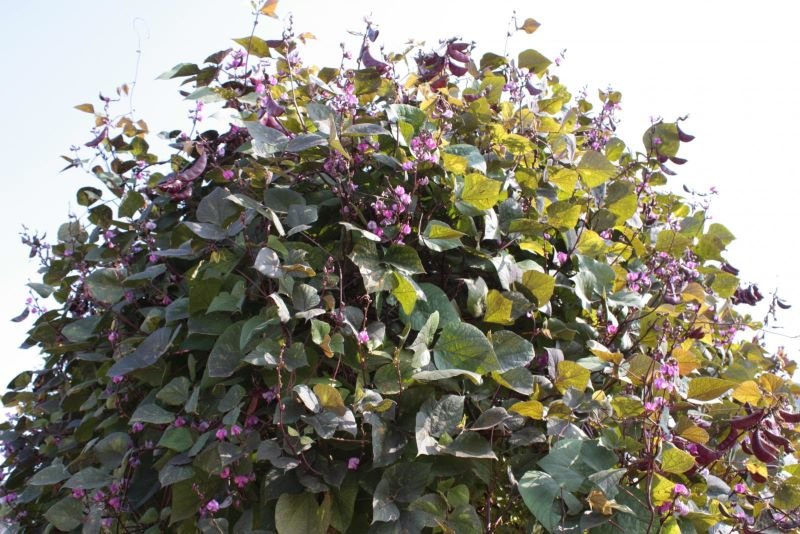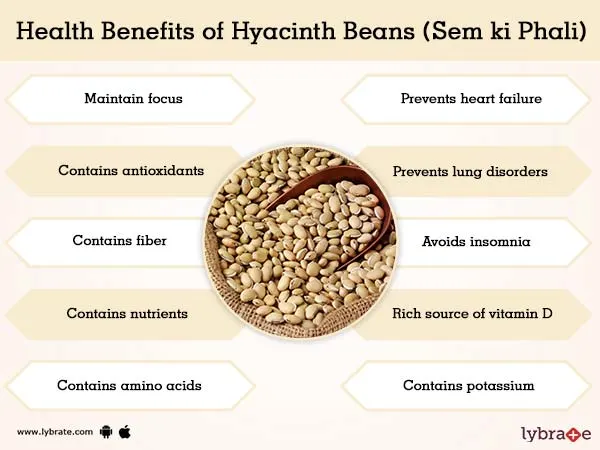Top 10 White Hyacinth Bean Benefits And Potential Side Effects

You’ve heard about the benefits of white hyacinth beans, but do you really know what they can do for your health? In this article will explore the top 10 white hyacinth bean benefits as well as its potential side effects.
We’ll look at the nutritional information found in these tiny legumes and how they can help improve digestion, fight inflammation, strengthen bones, control blood sugar levels, boost immunity, and more.
In addition to all these great benefits, we’ll also discuss any potential side effects associated with consuming white hyacinth beans.
So if you’re curious about adding this amazing food to your diet – read on!
What is White Hyacinth Bean?
White hyacinth bean, scientifically known as Lablab purpureus or Dolichos lablab or Sem ki Phali is a fascinating plant that belongs to the legume family.

©FOREST & KIM STARR-2012 – CC BY 4.0
It is commonly cultivated for its edible beans and attractive flowers. If you’re looking to add a touch of elegance to your garden or explore a nutritious and versatile legume, the white hyacinth bean might just be what you’re searching for.
This beautiful vine is native to tropical regions of Africa and is now cultivated worldwide for its ornamental and culinary value.
It derives its name from the lovely clusters of white, pink, or lavender flowers that resemble hyacinths, blooming throughout the warm months. These fragrant blossoms not only enhance the aesthetic appeal of gardens but also attract pollinators like bees and butterflies.
Apart from its ornamental beauty, the white hyacinth bean is highly valued for its nutritional benefits. The plant produces elongated pods that contain edible seeds, commonly known as beans. These beans are rich in protein, dietary fiber, vitamins, and minerals.
They can be consumed fresh or cooked and incorporated into a wide variety of delicious dishes.
Cultivating white hyacinth bean is relatively easy, making it an excellent choice for both experienced gardeners and beginners. It thrives in warm climates and prefers well-drained soil with full sun exposure.
The vine is a fast grower and can climb on trellises, fences, or other structures, adding vertical interest to your garden. Regular watering and occasional fertilization will ensure healthy growth and a bountiful harvest.

Beyond its horticultural and nutritional attributes, the white hyacinth bean has cultural significance in various regions.
It has been cultivated for centuries in different parts of the world, with its seeds and leaves incorporated into traditional cuisines.
Additionally, some cultures believe that the plant possesses medicinal properties and use it to address certain ailments, although scientific research on these claims is limited.
Nutritional Information
White hyacinth beans are a nutrient-packed powerhouse, providing essential vitamins and minerals that offer numerous health benefits without any significant side effects.
With each serving containing just over one hundred calories, white hyacinth beans are an excellent source of dietary fiber, protein, and complex carbohydrates.
These beans also contain high levels of folate, iron, potassium, magnesium, zinc, and various other B vitamins.
Each one serving contains approximately 20 grams of protein and 6 grams of dietary fiber. In addition to these benefits, the beans provide a rich source of antioxidants which help protect cells from damage caused by free radicals.
Here’s a detailed table showcasing the nutritional facts of White Hyacinth Beans (per 100 grams):
| Nutrient | Amount |
|---|---|
| Calories | 347 |
| Protein | 24.5 grams |
| Carbohydrates | 63 grams |
| Fiber | 11.3 grams |
| Fat | 1.6 grams |
| Vitamin C | 13 milligrams |
| Thiamine (Vitamin B1) | 0.4 milligrams |
| Riboflavin (Vitamin B2) | 0.2 milligrams |
| Niacin (Vitamin B3) | 1.7 milligrams |
| Vitamin B6 | 0.4 milligrams |
| Folate (Vitamin B9) | 120 micrograms |
| Calcium | 130 milligrams |
| Iron | 5 milligrams |
| Magnesium | 250 milligrams |
| Phosphorus | 345 milligrams |
| Potassium | 1,400 milligrams |
| Sodium | 15 milligrams |
| Zinc | 3 milligrams |
Please note that the nutritional composition can vary slightly depending on factors such as cultivation conditions and cooking methods.
White Hyacinth Bean Benefits

1. Improves Digestion
Consuming white hyacinth beans can help boost your digestive health, providing relief from common issues such as bloating and indigestion.
The benefits include increased fiber intake which helps keep the digestive tract regular and aids in proper elimination of waste, high amounts of prebiotic compounds that nourish good bacteria in the gut, promoting better digestion, protein content that helps build enzymes used to break down food for easy digestion, and presence of antioxidants which reduce inflammation in the stomach lining and protect against oxidative damage.
White hyacinth beans are a great addition to any diet because they can help improve digestion and prevent gastrointestinal issues like irritable bowel syndrome, constipation, and diarrhea.
They also contain vitamins A, B-complex, C, E, K, calcium, iron, magnesium, and zinc – all important nutrients necessary for healthy digestion.
Eating white hyacinth beans regularly can significantly reduce your risk for developing digestive problems while providing essential nutrition to maintain overall wellness.
2. Fights Inflammation
You can fight inflammation naturally with white hyacinth beans, which are packed with anti-inflammatory compounds.
These beans contain a compound called saponin, which has been shown to reduce inflammation in research studies. It works by inhibiting the release of inflammatory chemicals that cause swelling and pain.
In addition, white hyacinth beans also contain flavonoids, which can help reduce oxidative stress caused by free radicals in the body. This helps to protect cells from damage and further inflammation.
White hyacinth bean extract can be taken orally or topically for anti-inflammatory effects. Studies have shown that it may be effective at reducing joint pain, swelling and stiffness associated with arthritis when taken orally over a period of time.
Topical applications of white hyacinth bean extract may also provide relief from skin irritation and redness caused by eczema or psoriasis.
3. Strengthens Bones
Eating white hyacinth beans can help strengthen bones. They are packed with minerals like calcium and magnesium that are essential for bone health.
These vital nutrients play a key role in maintaining strong and healthy bones by bolstering the production of collagen and helping to slow down the rate of bone loss.
Here’s how they work:
- Calcium:
- Plays an important role in controlling skeletal muscle contraction as well as nerve conduction, helping to reduce pain associated with osteoporosis
- Enhances absorption of dietary minerals such as iron, zinc, and phosphorus into the body
- Necessary for the formation of bones and teeth
- Magnesium:
- Helps absorb calcium in order to form strong bones & teeth
- Aids in the prevention of inflammation that weakens bones over time
- Regulates hormones necessary for proper bone growth & maintenance
White hyacinth beans additionally contain other essential vitamins & minerals like potassium, folate, vitamin C, vitamin K1 & K2 that have a positive correlation with improved bone density. Eating white hyacinth beans regularly helps ensure your body gets enough of these crucial nutrients needed for healthy bones.
4. Improves Blood Sugar Control
Regularly partaking in white hyacinth beans can help to regulate your blood sugar levels. Eating a diet that includes white hyacinth beans is an effective and natural way to control diabetes.
Not only do they contain essential nutrients such as fiber, protein, iron, and magnesium; but also have the potential to reduce glucose levels in those with type 2 diabetes.
| Benefits | Potential Side Effects |
|---|---|
| Regulates Blood Sugar Levels | Gas & Bloating |
| Contains Essential Nutrients | Allergic Reactions |
| Reduces Glucose Levels | Diarrhea & Constipation |
White Hyacinth beans are packed with antioxidants that prevent free radicals from damaging cells which further helps maintain normal blood sugar levels. They also produce a slow release of energy which prevents glucose spikes after meals.
Furthermore, including them into your diet has been linked with reducing the risk of metabolic syndrome and heart diseases due to their ability to improve insulin sensitivity in individuals who are overweight or obese.
These benefits demonstrate how helpful these small legumes can be for managing diabetes over time.
5. Aids Weight Loss
Incorporating white hyacinth beans into your diet can help you lose weight, despite potential gastrointestinal side effects. The high fiber and protein content of the beans make them a powerful addition to any weight loss regimen.
White hyacinth beans have three main benefits that contribute to aiding weight loss:
- High Fiber Content: White hyacinth beans contain a significant amount of dietary fiber, which keeps you feeling full for longer and helps prevent cravings throughout the day. This reduces calorie intake and contributes to overall weight loss.
- Low Glycemic Index: The glycemic index is a measure of how quickly carbohydrates in food are absorbed into the bloodstream and converted to glucose (sugar). Foods with low glycemic indexes are digested more slowly, which helps reduce hunger pangs and cravings later on in the day as well as promoting steady energy levels rather than rapid spikes in blood sugar followed by crashes. Since white hyacinth beans have a low glycemic index, they can help contribute to sustained energy levels throughout the day, which will aid in weight loss efforts by reducing cravings for unhealthy snack foods or sugary drinks between meals.
- High Protein Content: The high protein content of white hyacinth beans makes them an excellent source of nutrition that can satisfy hunger without adding empty calories through fat or added sugar like many processed snack foods do. Furthermore, since protein takes longer to digest than carbohydrates, it will keep you fuller for longer periods of time, reducing calorie intake over time and contributing significantly towards successful long-term weight loss efforts.
White hyacinth beans provide great nutritional benefits that can be easily incorporated into almost any diet plan, regardless of lifestyle or cuisine preference, making them an ideal supplement for anyone looking to lose some extra pounds while still enjoying delicious meals packed with essential nutrients!
6. Improves Heart Health
Consuming white hyacinth beans on a regular basis can provide numerous health benefits, including improved heart health.
White hyacinth beans contain compounds that have been shown to help reduce stress in the cardiovascular system and improve overall heart health. These compounds act as antioxidants which help protect cells from damage caused by free radicals.
Additionally, white hyacinth beans contain potassium, magnesium, and other minerals that are important for maintaining healthy blood pressure levels.
Eating a diet rich in white hyacinth beans can also reduce cholesterol levels, thereby lowering the risk of developing cardiovascular diseases such as atherosclerosis and coronary artery disease.
Furthermore, they are high in fiber which helps to reduce bad cholesterol levels while promoting good cholesterol levels thus reducing the risk of stroke or heart attack.
White hyacinth beans are also rich in plant sterols which have been proven to fight inflammation and regulate hormones in the body associated with heart health such as LDL-cholesterol and triglycerides.
Further reading: Legumes as Functional Food for Cardiovascular Disease
7. Reduces Cholesterol
By eating white hyacinth beans, cholesterol levels can be significantly reduced. Here are some ways it can happen:
White hyacinth beans contain high amounts of dietary fiber, which helps to reduce cholesterol by preventing its absorption in the small intestine.
The presence of saponins in white hyacinth beans also helps to reduce cholesterol levels by blocking its production in the liver and reducing serum cholesterol levels.
White hyacinth beans contain phytosterols, plant-based compounds that help to block cholesterol absorption in the intestines and improve lipid metabolism throughout the body.
These beneficial nutrients work together to support healthy cholesterol levels and prevent cardiovascular diseases such as heart attacks and strokes.
Eating white hyacinth beans regularly can also help protect against other conditions such as diabetes, obesity, and cancer due to their anti-inflammatory effects on the body’s cells.
Furthermore, these tasty legumes are a great source of energy for those who want an alternative to refined carbohydrates or processed snacks. Adding them to your diet can help keep you full for longer periods of time while providing essential nutrients for optimal health.
8. Promotes Skin Health
Adding white hyacinth beans to your diet could help promote healthy skin! These beans are an excellent source of essential vitamins and minerals such as zinc.
Zinc helps improve the repair and regeneration of new skin cells, which can help even out your skin tone. White hyacinth beans also contain high amounts of selenium, which helps protect the body from damage caused by free radicals and UV rays.
| Nutrient | Source | Benefits |
|---|---|---|
| Zinc | Beans | Repair & Regeneration of New Skin Cells |
| Selenium | Beans | Protects Body From Damage Caused By Free Radicals & UV Rays |
White hyacinth beans are also a great source of antioxidants that can combat oxidative stress in the body, helping maintain healthy skin cells for longer periods of time.
This is especially beneficial for those with sensitive skin or who suffer from chronic conditions like psoriasis or eczema.
Eating these beans regularly can help reduce inflammation and provide relief from dryness and irritation.
Finally, adding white hyacinth bean to your diet will give you vitamins A and C, which both play key roles in maintaining healthy skin. Vitamin A helps keep your mucous membranes moist while vitamin C helps build collagen fiber, keeping your skin firm and youthful-looking. Eating this delicious bean regularly is sure to give you a glowing complexion!
9. Boosts Immunity
Eating white hyacinth beans on a regular basis can help boost your immunity! These beans are rich in vitamins and minerals such as Vitamin C, Vitamin A, riboflavin, niacin, phosphorus, and potassium.
They are also packed with antioxidants, like flavonoids, which protect the body from damage caused by free radicals that can weaken the immune system.
White hyacinth beans are an excellent source of zinc, which helps support a healthy immune response by aiding in cell growth and division. Zinc works with proteins that interact with bacteria and viruses to fight off infection. Additionally, white hyacinth beans are an important source of dietary fiber, which is essential for maintaining a healthy gut microbiome.
Having a diverse population of beneficial bacteria in your gut helps to stimulate the production of antibodies that fight off infections and aid the digestive process. The combination of antioxidants, vitamins, and minerals found in white hyacinth beans makes them an excellent choice for boosting overall immunity.
Finally, consuming these versatile beans can help you stay energized throughout the day while protecting your body from illness-causing pathogens.
10. Rich in Antioxidants
White hyacinth beans are absolutely overflowing with antioxidants, making them a superfood that’s bursting with immunity-boosting power! These powerful compounds help to protect your cells from damage caused by free radicals.
Rich in polyphenols and flavonoids, white hyacinth beans can also help reduce the risk of inflammation and chronic diseases. Research has found that consuming white hyacinth beans is associated with improved heart health.
Eating these legumes on a regular basis can help decrease bad cholesterol levels while increasing good cholesterol levels as well as lower blood pressure numbers.
They’re also an excellent source of dietary fiber which helps maintain healthy intestinal bacteria balance and regulate digestion. In addition to promoting better overall health, eating white hyacinth beans may even have anti-aging benefits due to their high antioxidant content.
Studies suggest that consuming these legumes may prevent wrinkles, age spots, and other signs of aging by protecting skin cells from oxidative damage.
White hyacinth beans can be easily incorporated into your diet through salads, soups or stir-fries for a delicious way to get all the many nutritional benefits they provide!
Potential Side Effects
Despite the many health benefits of white hyacinth beans, it’s important to be aware of potential side effects that could occur.
Consuming white hyacinth beans in excessive amounts may cause some negative reactions, such as nausea, vomiting and stomach cramps.
People with allergies to legumes should also avoid eating these beans.
| Reactions | Symptoms | Treatment |
|---|---|---|
| Nausea/Vomiting | Feeling unwell, dizziness, abdominal pain and diarrhea. | Increase intake of fluids if needed. Speak to a doctor for advice if symptoms persist. |
| Allergic reaction | Swelling of the lips or throat, itching or hives on the skin and difficulty breathing. | Seek medical attention immediately if any of these signs are present as they can be life-threatening conditions. Avoid consuming legumes if allergic reactions occur in the past when eating them. |
Stomach cramps may also arise from consuming white hyacinth beans due to its high fiber content which can be hard for some peoples digestive systems to process.
Eating too many of these beans could overload your system leading to bloating and gas resulting in uncomfortable stomach pains and cramping sensations.
To reduce these possible side effects, start by introducing small amounts into your diet slowly over time so your body can adjust better and prevent any unwanted discomfort or pain caused by eating too much at once.
Frequently Asked Questions
Is white hyacinth bean safe for pregnant women?
You’re wondering if white hyacinth bean is safe for pregnant women? Well, it’s a tricky question! While research suggests the bean has certain potential health benefits, it can also have side effects. So it’s best to be cautious and consult your doctor before trying it out.
Can white hyacinth bean be eaten raw?
Hyacinth beans are POSSIBLY UNSAFE when eaten raw and in large amounts.
Is white hyacinth bean suitable for people with celiac disease?
White hyacinth bean is not suitable for people with celiac disease due to its gluten content. Eating it can cause an immune reaction in those who are sensitive, leading to symptoms such as bloating and diarrhea. Therefore, caution should be taken when consuming this food.
How should white hyacinth bean be prepared?
To prepare white hyacinth bean, soak the beans overnight and then boil for around 40 minutes. Add salt or other seasonings to taste. Enjoy!
How much white hyacinth bean should be consumed daily?
Consume no more than one cup of white hyacinth bean daily. Studies show it can help improve overall health, but too much can lead to adverse effects. So enjoy the benefits without overdoing it!
Bottom Line
White hyacinth beans are a powerhouse of nutrition, aiding digestion, and strengthening bones. Even better, they’re virtually free of side effects! White hyacinth beans are like a gift from heaven, almost too good to be true.
The potential for improved health is literally out of this world! So why not indulge in these nutritious beans and reap their numerous rewards?
Read Next
